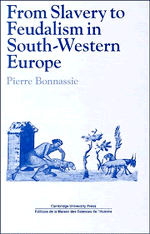Book contents
- Frontmatter
- Contents
- List of maps
- Foreword by T. N. Bisson
- Abbreviations
- 1 The survival and extinction of the slave system in the early medieval West (fourth to eleventh centuries)
- 2 Society and mentalities in Visigothic Spain
- 3 From the Rhône to Galicia: origins and modalities of the feudal order
- 4 Descriptions of fortresses in the Book of Miracles of Sainte-Foy of Conques
- 5 The formation of Catalan feudalism and its early expansion (to c. 1150)
- 6 Feudal conventions in eleventh-century Catalonia
- 7 The noble and the ignoble: a new nobility and a new servitude in Catalonia at the end of the eleventh century
- 8 Rural communities in Catalonia and Valencia (from the ninth to the mid-fourteenth centuries) (in collaboration with Pierre Guichard)
- 9 From one servitude to another: the peasantry of the Frankish kingdom at the time of Hugh Capet and Robert the Pious (987–1031)
- 10 Marc Bloch, historian of servitude: reflections on the concept of ‘servile class’
- Index
- Past and Present Publications
10 - Marc Bloch, historian of servitude: reflections on the concept of ‘servile class’
Published online by Cambridge University Press: 04 August 2010
- Frontmatter
- Contents
- List of maps
- Foreword by T. N. Bisson
- Abbreviations
- 1 The survival and extinction of the slave system in the early medieval West (fourth to eleventh centuries)
- 2 Society and mentalities in Visigothic Spain
- 3 From the Rhône to Galicia: origins and modalities of the feudal order
- 4 Descriptions of fortresses in the Book of Miracles of Sainte-Foy of Conques
- 5 The formation of Catalan feudalism and its early expansion (to c. 1150)
- 6 Feudal conventions in eleventh-century Catalonia
- 7 The noble and the ignoble: a new nobility and a new servitude in Catalonia at the end of the eleventh century
- 8 Rural communities in Catalonia and Valencia (from the ninth to the mid-fourteenth centuries) (in collaboration with Pierre Guichard)
- 9 From one servitude to another: the peasantry of the Frankish kingdom at the time of Hugh Capet and Robert the Pious (987–1031)
- 10 Marc Bloch, historian of servitude: reflections on the concept of ‘servile class’
- Index
- Past and Present Publications
Summary
The problem of servitude haunted Marc Bloch. His first piece of research, published in 1911, was about the serfs of the chapter of Notre-Dame of Paris at the time of Blanche of Castile. One of his last articles, published posthumously, was about slavery in the early Middle Ages. In between came his thesis, Rois et serfs, nine articles (amongst the most important he wrote) and several crucial chapters in his major works, Les caractères originaux and La Société féodale: in all, he devoted many hundreds of pages to this absorbing question: the enserfment of man by man.
Bloch's principal ideas
‘Slavery and serfdom: a historical contrast’: if there was one idea which Marc Bloch held dear, which he never ceased to assert with growing conviction, and demonstrate with increasing rigour, it was that of the radical transformation experienced by the Middle Ages with regard to servitude. He placed this transformation firmly in the tenth and eleventh centuries, a period of ‘great social disorder and renewal’.
Ancient slavery survived into Carolingian times. In this respect, the ‘great invasions’ changed nothing; there was even an increase in the numbers reduced to slavery in the fifth century. The slave living in the Frankish kingdom was still relegated to the ranks of objects, at best an animal; devoid, at all events, of his individuality, lacking all status, thus any guarantees, he was ‘a foreigner’.
- Type
- Chapter
- Information
- From Slavery to Feudalism in South-Western Europe , pp. 314 - 340Publisher: Cambridge University PressPrint publication year: 1991



